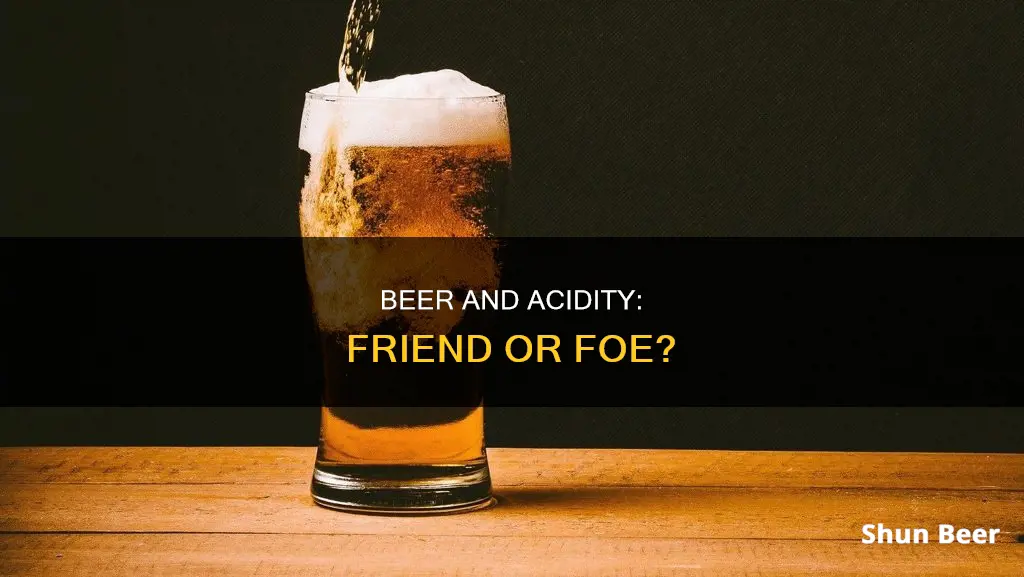
Drinking alcohol can increase the risk of developing gastroesophageal reflux disease (GERD), a chronic medical condition caused by the inability of the lower part of the oesophagus to function properly. Beer and wine have been found to trigger reflux in both men and women compared to drinking water. However, the effects of alcohol on acid reflux vary from person to person, and there is no conclusive evidence that one type of alcohol is better or worse for people with GERD. While some people with GERD choose to avoid alcohol completely, others experiment with different drinks to find what works for them. Spirits with a high ethanol content, such as gin, whiskey, and cognac, may be better options for people with acid reflux, as they are less likely to stimulate stomach acid secretion. Low pH spirits such as tequila and non-grain vodka are also recommended.
| Characteristics | Values |
|---|---|
| Effect on acid reflux | Beer can trigger acid reflux and worsen Gastroesophageal Reflux Disease (GERD) symptoms. |
| Risk of developing GERD | Drinking alcohol can increase the risk of developing GERD, with higher intake and frequency linked to the condition. |
| Recommended intake for acid reflux sufferers | Acid reflux sufferers should limit their intake to one drink and avoid drinking 2-3 hours before bed. |
| Alternative drinks | Spirits with high ethanol content, such as gin, whiskey, cognac, tequila, and non-grain vodka, may be better options for acid reflux sufferers. |
| Dietary considerations | Acid reflux sufferers should avoid greasy, high-fat foods, smoking, and drinks with high natural acidity or made with peppermint, chocolate, or coffee. |
What You'll Learn
- Beer and wine trigger reflux in both men and women
- Drinking 3 or fewer alcoholic beverages a week may be associated with GERD
- Alcohol relaxes the lower oesophagus, making it easier for stomach acid to back up
- Spirits with a high ethanol content may be less likely to cause GERD
- High-proof spirits are less likely to stimulate stomach acid secretion

Beer and wine trigger reflux in both men and women
Beer and wine have been found to trigger reflux in both men and women. A 2006 study found that drinking beer or wine increased reflux compared with drinking water. The study involved 25 participants, 18 men and seven women, who drank 300ml of white wine, 500ml of beer, or water, along with a standardised meal. The results showed that both alcoholic beverages increased reflux compared to water, with no significant difference between wine and beer.
Gastroesophageal reflux disease (GERD) is a chronic medical condition caused by the abnormal reflux of gastric contents back up into the oesophagus. This can cause irritation of the oesophageal lining, known as reflux esophagitis, or non-erosive reflux disease (NERD), which does not involve breaks in the oesophageal mucosal. Symptoms of GERD include a burning sensation in the chest, often called heartburn, and chronic irritation of the oesophagus, which can significantly impair quality of life.
Alcohol and GERD
Alcohol consumption may be a risk factor for GERD, with heavy drinking putting people at high risk. Alcohol can relax the lower oesophageal sphincter, making it easier for stomach acid to back up and cause irritation. Research has shown that drinking alcohol, especially in large quantities, can increase the risk of GERD. However, the relationship between alcohol consumption and GERD is not yet fully understood, and some studies have found conflicting results.
Reducing the Risk of GERD
For those prone to acid reflux or living with GERD, healthcare professionals recommend limiting or avoiding alcohol altogether. Other tips to reduce the risk of GERD symptoms when drinking include limiting yourself to one drink, avoiding drinking alcohol 2-3 hours before bed, and keeping a journal of foods and drinks consumed to identify any patterns.
Beer Overconsumption: Swelling and Health Risks
You may want to see also

Drinking 3 or fewer alcoholic beverages a week may be associated with GERD
Drinking alcohol is a significant risk factor for developing gastroesophageal reflux disease (GERD). GERD is a chronic condition where stomach contents come back up into the oesophagus, causing symptoms such as heartburn, indigestion, and nausea. According to a 2019 review, increased alcohol intake and drinking frequency are linked to a higher risk of developing GERD.
However, a 2022 review found that consuming three or fewer alcoholic drinks per week may be associated with GERD. This finding suggests that low alcohol consumption might be linked to the disease. While the exact mechanism is not fully understood, alcohol is believed to affect the function of the oesophagus and cause damage to the oesophageal and gastric linings. It can also relax the lower oesophageal sphincter (LES), a band of muscles that protects the oesophagus from stomach acid, making it easier for acid to flow back up.
Healthcare professionals often recommend that people prone to acid reflux or living with GERD limit or avoid alcohol altogether. This recommendation is supported by organisations like the American College of Gastroenterology and the National Institute of Diabetes and Digestive and Kidney Diseases. Additionally, making lifestyle modifications, such as quitting smoking and managing weight, may also help reduce GERD symptoms.
While the link between alcohol and GERD is well-established, the specific type of alcoholic beverage that aggravates symptoms the most is still unclear. Some studies have found that beer and wine can trigger reflux, while others suggest that spirits with a high ethanol content, like gin or whiskey, may be better tolerated by people with acid reflux.
Beer and Tramadol: A Safe Mix?
You may want to see also

Alcohol relaxes the lower oesophagus, making it easier for stomach acid to back up
Alcohol can have a relaxing effect on the lower oesophageal sphincter (LES). The LES is a circular muscle that opens when you swallow, allowing food to pass into the stomach, and closes again to keep substances in the stomach. It also opens a little to let gas bubbles out when you're burping or have hiccups. However, when the LES weakens or relaxes, it can allow stomach acid to pass back up into the oesophagus, causing acid reflux.
Alcohol consumption can increase the risk of developing gastroesophageal reflux disease (GERD), a chronic medical condition caused by the inability of the lower part of the oesophagus to function properly. GERD is characterised by a burning sensation in the chest, often referred to as heartburn, and irritation of the oesophagus. Research has shown that higher alcohol intake and frequency are more strongly linked with GERD.
The relationship between alcohol consumption and GERD is complex and not yet fully understood. While some studies suggest that alcohol increases the risk of GERD, others have found no significant association or even inverse associations. For example, a Swedish study found that alcohol consumption was not associated with any change in the risk of GERD, and that cessation of alcohol consumption did not improve oesophageal pH profiles or reduce symptoms.
The effect of alcohol on the LES may be related to its impact on the autonomous nervous system. Acute alcohol consumption can relax the LES, allowing the reflux of stomach contents into the oesophagus. This relaxation of the LES may be due to the inhibitory effect of alcohol on calcium influx into the esophageal smooth muscle. Additionally, alcohol can directly inhibit the contractility of the oesophagus, further contributing to acid reflux.
The risk of GERD may also be influenced by the type of alcoholic beverage consumed. Beer and wine have been found to trigger reflux compared to drinking water, although the difference between beer and wine was not significant in one study. Spirits with a high ethanol content, such as gin, whiskey, and cognac, may be better for people with acid reflux as high-proof spirits are less likely to stimulate stomach acid secretion.
To reduce the risk of GERD symptoms, it is generally recommended to limit alcohol consumption or avoid it altogether, especially before bed. Waiting at least 2-3 hours before lying down after drinking can help reduce the risk of experiencing acid reflux at night.
Fish and Beer: A Curious Friendship
You may want to see also

Spirits with a high ethanol content may be less likely to cause GERD
Drinking alcohol can relax the lower esophageal sphincter, causing acid reflux, which can lead to gastroesophageal reflux disease (GERD). GERD is a chronic medical condition caused by the inability of the lower part of the oesophagus to function properly. This results in a burning sensation in the chest, often referred to as heartburn, and irritation of the oesophagus.
Research has shown that alcohol consumption may be a risk factor for GERD. A 2019 review found that higher intake and frequency of alcohol consumption were more strongly linked with GERD. However, spirits with a high ethanol content, such as gin, whiskey, and cognac, may be less likely to cause GERD symptoms than beer or wine. High-proof spirits are less likely to stimulate stomach acid secretion than drinks with lower ethanol content.
A small 2006 study examined the effects of beer and wine on acid reflux. It found that both beer and wine triggered reflux in men and women compared to drinking water. On the other hand, a 2008 study found that drinking wine could reduce the risk of reflux oesophagitis or irritation of the oesophageal lining.
While the research on the specific effects of different types of alcohol on GERD is inconclusive, healthcare professionals often recommend that people prone to acid reflux or living with GERD limit or avoid drinking alcohol altogether.
Beer and Eliquis: A Safe Mix?
You may want to see also

High-proof spirits are less likely to stimulate stomach acid secretion
Drinking alcohol can increase the risk of developing gastroesophageal reflux disease (GERD), a chronic condition where the lower part of the oesophagus is unable to function properly, causing a burning sensation in the chest and irritation of the oesophagus. This condition is often referred to as heartburn.
Beer and wine are strong stimulants of gastric acid secretion and gastrin release, which can lead to acid reflux. Research has shown that beer and wine can trigger reflux in both men and women. However, spirits with a high ethanol content, such as gin, whiskey, and cognac, may be better options for those prone to acid reflux.
In contrast, alcoholic beverages with low ethanol content, such as beer and wine, are strong stimulants of gastric acid secretion. The powerful stimulants in beer that cause this effect are yet to be identified, but they are believed to be thermostable and anionic polar substances.
Therefore, for those suffering from acidity problems, high-proof spirits are less likely to cause discomfort as they do not stimulate stomach acid secretion to the same extent as lower ethanol content drinks. However, it is important to note that alcohol can affect individuals differently, and some people may find that all types of alcohol aggravate their symptoms.
Beer and Hydroxyzine: Safe After 18 Hours?
You may want to see also
Frequently asked questions
Beer is known to be a heartburn risk because it is alcoholic, acidic, and carbonated. It is best to avoid beer if you have acidity.
Acid reflux is caused when the sphincter connecting the oesophagus to the stomach relaxes, allowing acidic stomach contents to flow up the oesophagus and irritate its lining. This causes a burning sensation, known as heartburn.
Frequent acid reflux, or gastroesophageal reflux disease (GERD), can lead to inflammation of the oesophagus, a narrowing of the oesophagus, chronic cough or sore throat, laryngitis, and more serious conditions such as pneumonia, asthma, Barrett's oesophagus, or cancer.
Alcoholic, acidic, and carbonated beverages, as well as greasy and spicy foods, are known to trigger acid reflux. Specific foods to avoid include citrus fruits, chocolate, coffee, hot spices, and mint.
Some people find relief from acid reflux by drinking a mixture of baking soda and water, or coconut water. It is also recommended to avoid eating or drinking close to bedtime.







